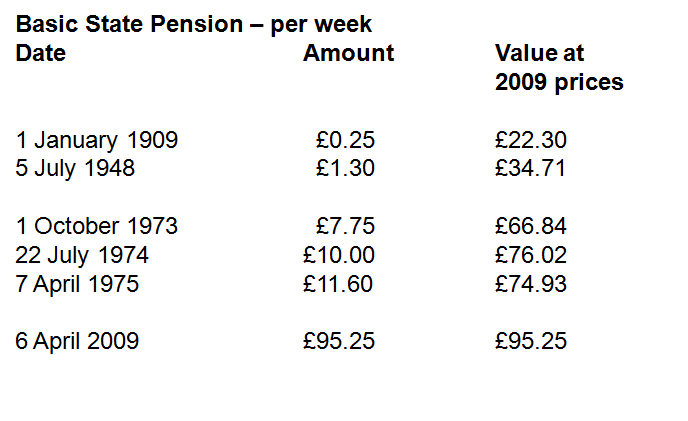
This talk was given 7 April 2009
The text here may not be identical to the spoken text
ASSOCIATION OF CHARITY OFFICERS
I’m Paul Lewis a freelance financial journalist, although best known I guess for my work presenting Money Box on Radio 4. But I also do other things – you can read my weekly thoughts on the Saga Magazine website.
But I am not here representing Money Box or, god forbid, the BBC.
I am very glad to be here to talk to you today. I was astonished at the range of benevolent organisations that belong to the Association. And the range of criteria for giving your target group money. I was pleased to see the Bankers Benevolent Fund – or Her Majesty’s Treasury as it’s now known. The Grand Prix Mechanics Charitable Trust – hard to know who qualifies as they keep changing the rules every year. And as for Footwear Friends – if the shoe fits. And I’ve made a careful note of the charities that help journalists and broadcasters in trouble. The way my pension fund is going I may need them.
Anyway it very nice to be here among charities. The other day I was talking to bankers. I said then it was nice to speak to people who were more mistrusted and despised than journalists. Now I suppose I must take that role.
I told you what I do now but my working life – I was going to say my career but that is too grand a title for the ragbag collection of tasks by which I have earned my living. My working life began in charities. I started with Age Concern – or as we now have to call it the charity formerly known as Age Concern. The new super-charity formed by combining Age Concern and Help the Aged was launched last week but it won’t get a name until next January.
Money
I worked for Age
Concern in the 1970s. Just after it had changed its name from the National Old
People’s Welfare Council. When I arrived one of the big concerns was pensioner
poverty. And as a young man in my twenties this puzzled me. Poverty seemed easy.
If people were poor give them money. Then they wouldn’t be poor.

At the time I arrived the state pension was £7.75 a week. And in case you're wondering what that was worth, it was £66.84 at today’s prices. And this week the basic state pension rises to £95.25. And we worried that £7.75 was not enough to live on – which it wasn’t –so we were pleased when that went up by £10 in July 1974 and again in April 1975.
Still not enough to live on but a lot more than when the present system began in 1948 when the state pension was £1-6s or £1.30. In today’s terms that is £34.71. So it had more than doubled in real terms in the quarter of a century since. And indeed in 1948 it was fixed much higher than the very first state pension paid in 1908 when it was 5/= – or 25p a week – and that was worth about £22.30 in today’s terms.
I make that point because my view at the time – if people are poor give them money – was very much the view of the day. And the state pension did rise over that period – and up to the present day – in real terms considerably.
But we were worried about
pensioner poverty. Partly because there was no means-tested top up. Or rather
there was but it really put the mean in means-tested. Let’s move to November
1975 and I give these figures because I know them very well from

this book which I wrote for Age Concern then. The state pension was increased up to £13.30. But the supplementary pension only brought your income up to £13.70 – an extra 40p. Worth £2.31 in today’s terms. So supplementary pension was a total of £13.70 – worth just £79.23 today.
From this week pension credit tops your income up to £130. And you can see the increases in both the state pension and the means-tested top up since 1975 – 34 years.
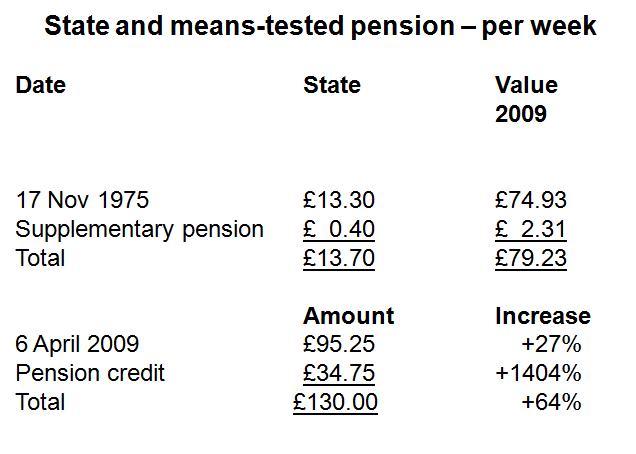
So although pensioner poverty has not been eradicated, it has been reduced since the 1970s by that simple means which I believed in then of giving the poor more money.
But it is still important to realise that
Worry No.1 for those on low incomes? Money.
Meanstesting
But making money
available is not enough. The £130 a week pension credit is definitely a lot more
than the £13.70 (£79.23) supplementary pension due in 1975. But more than two
million people who could get that income do not do so. Because it is
means-tested. And means-testing does not work.
When pension credit was introduced by the present government in October 2003 it was hailed as a great breakthrough in getting more money to older people who needed it. At its heart though was means-testing – a hated system of assessing the income and savings of people which went back to the last depression of the 1930s. And far from being new, pension credit replaced means-tested minimum income guarantee – which had replaced means-tested income support which had replaced means-tested supplementary benefit which had replaced means-tested National Assistance. None of them worked. Or at least only for those who claimed them.
From the start pension credit missed its targets – not of those who would be eligible but of those who would actually claim it. And things have not got any better. The latest figures for 2006/07 – which is the best that the DWP can provide at the moment – show that 2,620,000 people claim pension credit. And when I say ‘people’ these are potential claimants so a couple is counted as one. If we add back the other partner we get a bigger figure of 3,240,000 individuals who get pension credit. That couple problem of households vs individuals has plagued analysis of the figures with Ministers frequently confusing one figure with another and choosing the bigger one when it comes to those claiming and the smaller one when it comes to those not claiming. But let’s stick to households for now because that is easier. But remember that understates the number of people by about 20% among pensioners.
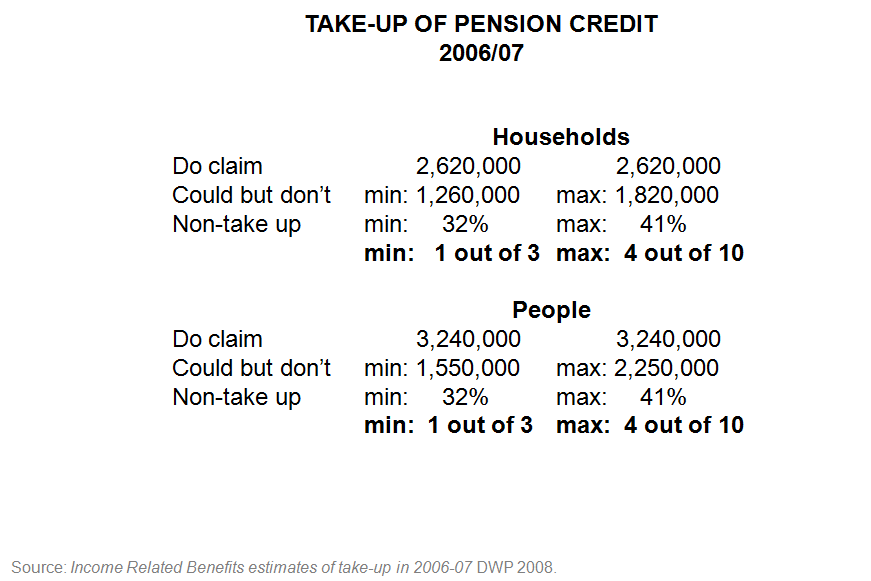
So 2,620,000 households who claim pension credit. And between 1,260,000 and 1,820,000 who do not. That range represents the uncertainty of these calculations. And it is no more meaningful to find the average of those than it is to pick the smaller or the bigger. So what you can say is that a minimum of a third and a maximum of four out of every ten who could claim pension credit do not do so. That is up to 1,820,000 households – which is probably about 2,250,000 people over 60 live on an income which is less than the amount provided for by pension credit. And that is three years into a mature scheme.
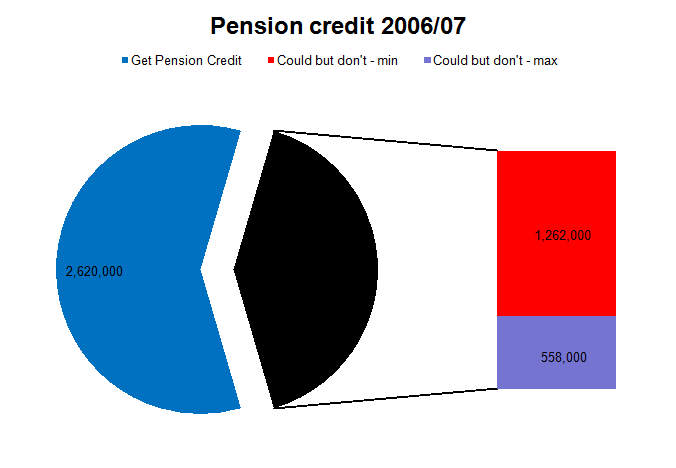
Here we can see it graphically.
Now if we plot the percentage non-take up year by year and despite almost annual initiatives to get people to claim we find that instead of shrinking it is in fact growing. Up from a max of 38% to 41% in four years.
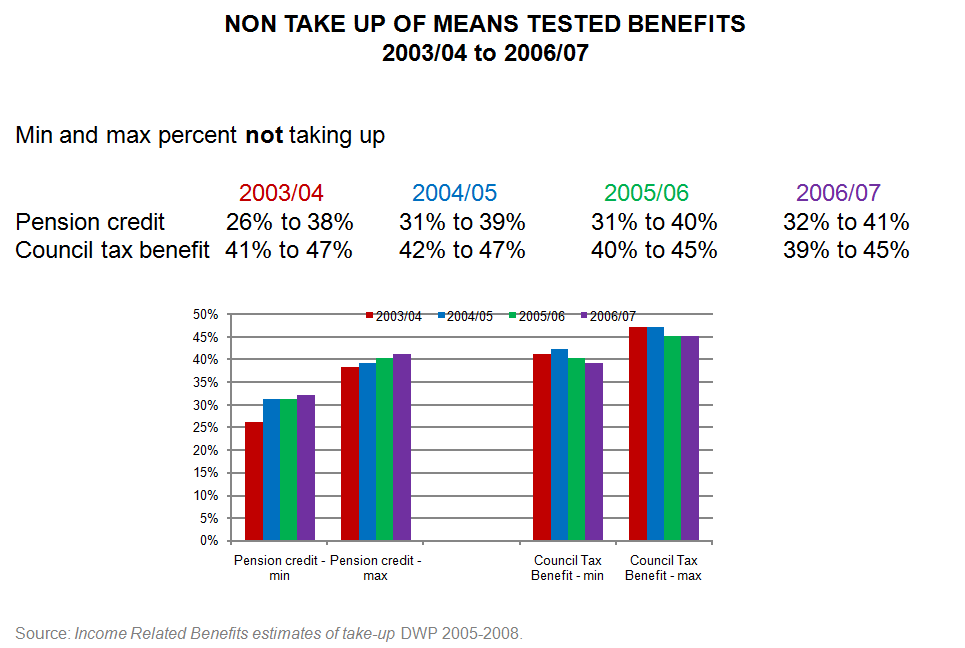
And if we take another means-tested benefit council tax benefit – that is shrinking slightly but is still stuck at up to 45%
Here is the pie chart – 55% claim up to 45% do not claim.
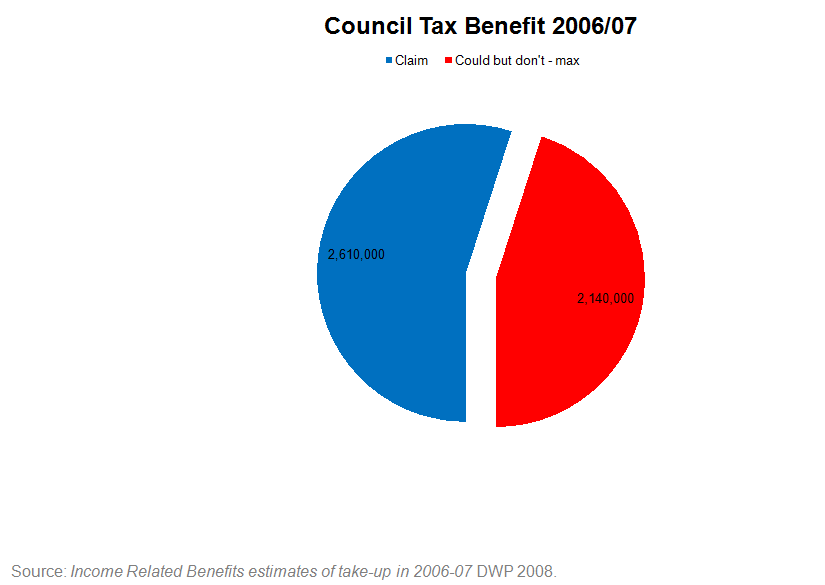
And the analysis now shows that pension credit take up campaigns struggle to get sufficient new claims to replace those people who have died. We are in a fairly steady state.
And a year ago the DWP accepted finally – what people have been telling it since well 1908 – that a means-tested pension does not reach a very large proportion of those who need it.
For 2008 the DWP was given this it had this Public Service Agreement or PSA target
PSA target 6: By 2008, be paying Pension Credit to at least 3.2 million pensioner households, while maintaining a focus on the most disadvantaged by ensuring that at least 2.2 million of these households are in receipt of the Guarantee Credit.
That is a poor enough target. Far fewer than could get the benefit. But it was failing to achieve even that. And so the DWP departmental report for 2008 said
"it has become clear to the Department that the target cannot be achieved, and it would not represent value for money to repeatedly press unwilling eligible people to take up their entitlement. "
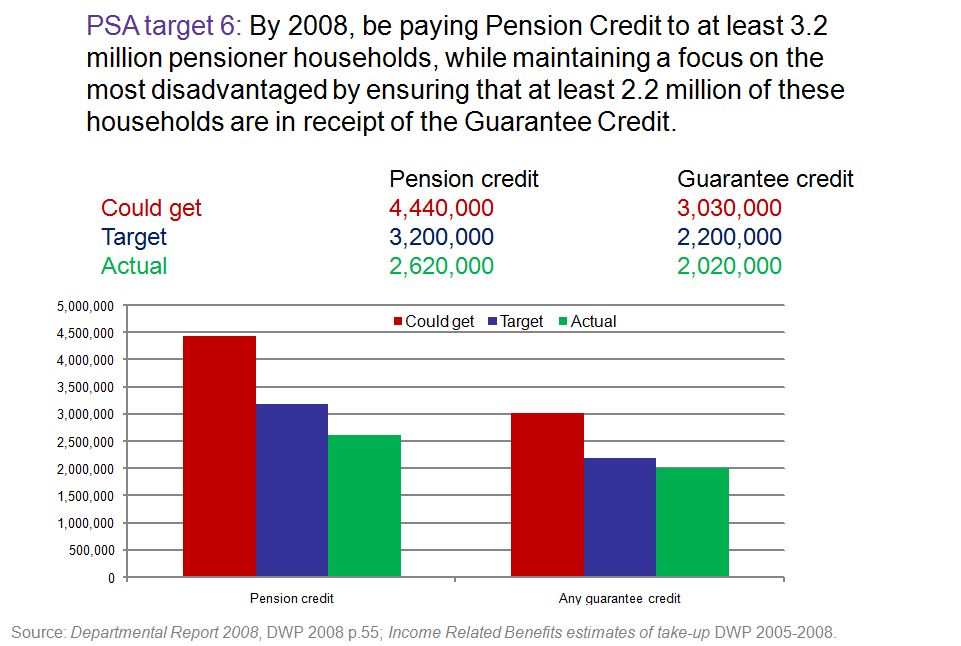
And in March last year pensions minister Mike O’Brien told me on Money Box
“We've pretty well got to saturation in terms of those people who are likely to just apply. We can work as hard as we can, but when we are contacting people five times over an 18 month period and they are still saying 'we don't want to apply' there is a limit to how far you can go."
So blame the low income pensioners, the claimants, not the policy.
He added,
"Our target now is 235,000 new applications [per year] by the end of the month and we are on target for that. What we are not going to do is continue with a target which it was clear we are not going to meet. I am not setting a target of 3.2 million for another date, no."
Now this is good news to the bean counters in the Treasury. Because those same figure show that the 1,260,000 to 1,820,000 people over 60 who don’t get the pension credit they could claim give up on average £28.40 a week and that saves the exchequer between £1.96 billion and £2.8 billion a year. And even in these times of borrowing more than a trillion pounds and committing ourselves to give, lend, guarantee, or fund more than £1 trn to the banks, though the final figure was estimated this week to be about £130 billion, a saving £2bn to £3bn is still a lot of money. And if you add on the savings on council tax benefit for those over 60 – between £1.1bn and £1.5 billion – and housing benefit you come to a total of between £3.5bn and £5bn a year saved. And £5bn a year is 1p off the basic rate of tax.
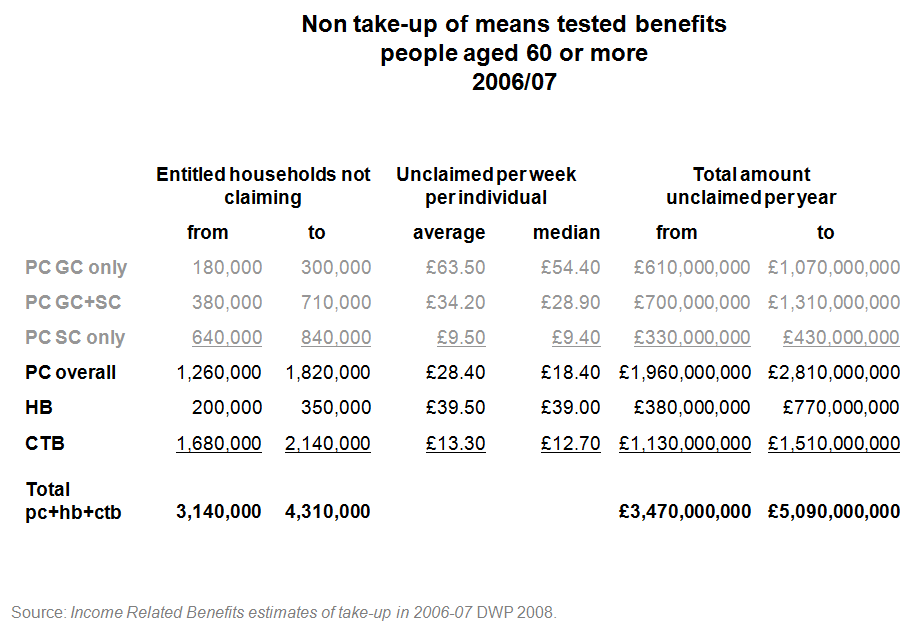
That shows the scale of how much means-testing does not work. Depending on the benefit between 19% – say one in five – and 58% – say six out of ten – of those who could claim do not do so.
One reason is that the whole benefit system is too complex.
Who gets pension credit? One big group are those who have not paid enough National Insurance contributions to get a full state pension. So there are an army of civil servants working in Newcastle who assess the National Insurance contributions and say ‘mmm you’ve not quite got the 44 years (39 if it’s a woman) to get a full state pension. You are six years short. So we’ll dock your pension down from £95.25 a week down to 83% of that which is £70.06. That’s a loss of £25.19. But then she calls the pension credit helpline and they say you live alone, your pension is £70.06 we’ll add another £25.19 to make it up to £95.25 and another £30.75 to make it up to £130. So it doesn’t matter if she paid all her contributions, 83% of them or none at all she would still get the same income from the state. But there is one army working out what to take away from her. And another army giving it back – and more.
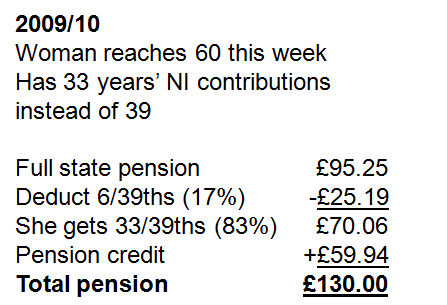
And there is one final idiocy of pension credit. The state pension and works pensions are taxable. Suppose your income from these two is £130 a week and you are under 65. So your tax allowance is £6475. £130 x 52 is £6760. So you get more than your tax allowance by £285 and that is taxed at 20% which is £57 or £1.10 a week. So you give that to the taxman – or woman. You then apply for pension credit. And that looks at your net income after tax which is £128.90. It then gives you £1.10 back in guarantee credit to make your income up to £130 a week. Under 65 you do not get savings credit so that is all the pension credit you get. So one army taxing you by £1.10 a week and another giving you back pension credit worth £1.10 a week.
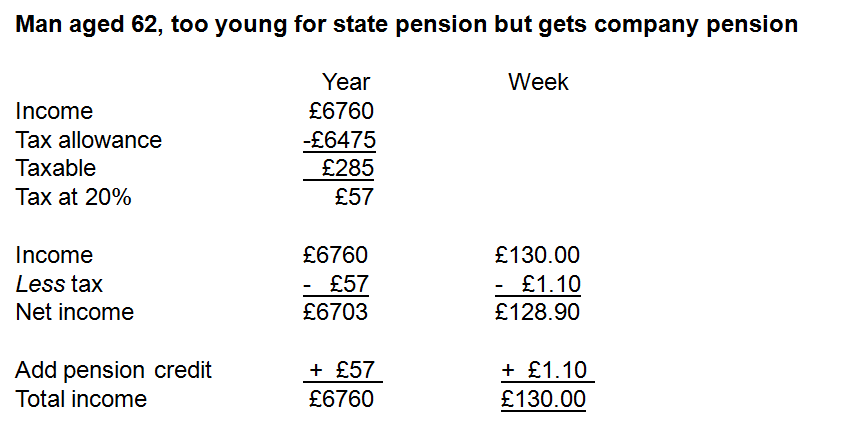
So means-testing is not just a good way of saving the Treasury £5 billion a year. It also keeps people in work. Doing the sums.
Means-testing doesn’t work. Has never worked. Can never work. Because between a fifth and more than a half of those entitled do not claim what they are entitled to. It is a way of seeming to get money to people while leaving out huge numbers. And then being able to blame them not the policy for the fact that they are still poor. Politically it is a perfect policy. Which is why it is so popular among politicians.
Worry no.2 for those on low incomes? means-testing.
Well I’ve banged on about giving poor people money for a long time this afternoon and concentrated on older people. But of course this week Save the Children decided it had to open a £150,000 fund to give crisis grants to poor families – especially one parent families. It said that rising prices and inadequate benefits meant that families were struggling as never before to provide their children with basic essentials.
And if you want to know how to scrap means-testing ask me later I do have a slide on it.
Warmth
I was going to
talk to you about inflation – but you can’t do anything about that. It is true
though that inflation affects low income households more than high income
households. Fuel costs in particular have gone up far more than inflation and
keeping your home warm is crucial for health and in some cases for life.
I mentioned my time at Age Concern. Some years after that I was involved in the early years with the National Right to Fuel Campaign. I was the chair of the campaign for some years up to 1983 and in those years we coined the phrase ‘fuel poverty’. We defined it loosely as not being able to afford to keep your home warm and light.
And it is a function of two things. First of course low income. And second a hard to heat home. Because there are people who are in poverty – living on income support or pension credit – but who can keep warm because their home is draught-proofed and insulated. And there are people whose income is well above the breadline but who are in fuel poverty because their home is very hard to heat and much of what they spend goes on inefficient heating systems and is lost through uninsulated walls or doors or window.
So fuel poverty is distinct from poverty though of course the two things overlap a lot. The modern definition is that a household is in fuel poverty if it spends more than 10% of available income on keeping the home warm and well lit.
So while the answer to poverty is give people money. The answer to fuel poverty is not just making sure income is boosted. It is also – and sometimes only – to spend money on improving the energy efficiency of their home.
And it’s not just a
theoretical idea. Every winter more people die than in the summer – 25,300 more
in winter 2007/08. Although it has come down in the UK it has now reached a
steady state of around 25,000 a year. 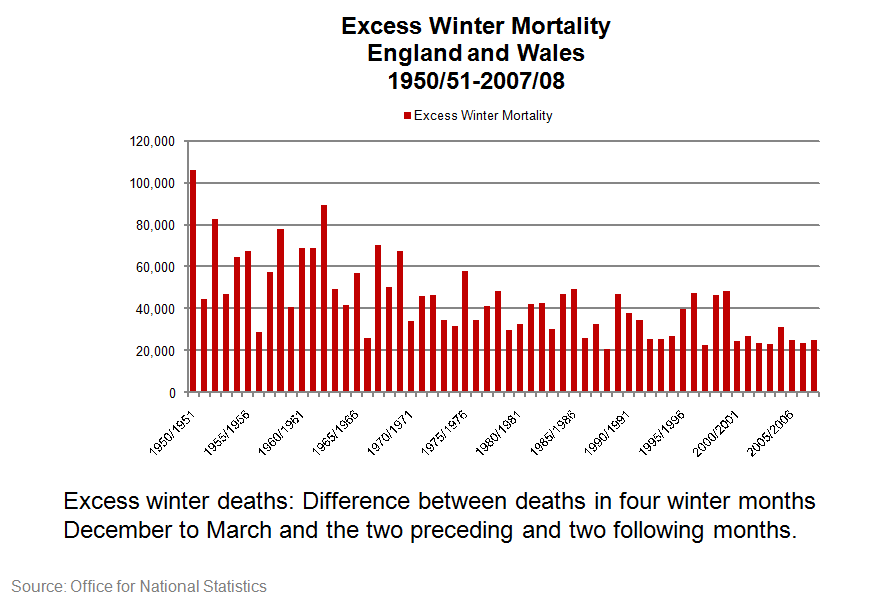
And don’t think this is an irreducible floor. This annual cull of the old and sick doesn’t happen in colder countries such as those in Scandinavia. They know fuel poverty is not a matter of comfort. It’s life or death.
Now you might hear people say – indeed I’ve said it myself – that by 2010 the Government has to end fuel poverty among pensioners, people who are disabled or ill, and households with children. It is, people say, the law. And when it has done that it has to move on and end it for every household – every one – by 2016.
Sadly that is not true. The commitment was put into the Warm Homes and Energy Conservation Act 2000. It said this
2(1) It shall be the duty of the appropriate authority to prepare and publish, before the end of the period of twelve months beginning with the relevant commencement, a strategy setting out the authority’s policies for ensuring, by means including the taking of measures to ensure the efficient use of energy, that as far as reasonably practicable persons do not live in fuel poverty.
The Government then had to set out a timetable and a programme to achieve that and for England it set it out like this
the Government as far as reasonably practicable will seek an end to fuel poverty for vulnerable households by 2010.
Fuel poverty in other households in England will, as far as reasonably practicable, also be tackled as progress is made on these groups, with a target that by 22 November 2016 no person in England should have to live in fuel poverty. ]
And the important bit is of course "As far as reasonably practical". There’s a get of jail free card isn’t it?
For a while it seemed that the government was moving towards achieving that aim and fuel poverty was reduced. It fell from 4 million households in 1996 to 1 million in 2004. But when fuel prices took off the numbers in fuel poverty rose and rose. A year ago it was around 2.5 million. And the Government admitted that there would still be a million vulnerable people in fuel poverty by 2010. And with the recession and fuel prices still very high, though slightly down on their peak, it will still be a lot more than that by next year.
Now I had often asked – and never got an answer – what would happen if the government missed that target? Yes it was often said to be legally binding. But what if ministers failed to do it? Would they be fined? Go to jail? Or would they hide behind the phrase ‘as far as reasonably practical?
Last year Help the Aged and Friends of the Earth went to court to get a judgement that the Government was going to fail and to get an injunction to make it do more. But the High Court didn’t accept that argument. On 23 October 2008 Mr Justice McCombe threw out the claim. Partly because the Government could consider the money it had available it implement that policy.
And more fundamentally because “the complaint made is as to the policies adopted by the government in meeting its own policy objectives set out in the Strategy. It is here that the statutory scheme of imposing a legal duty to implement a broad policy document is at its most unsound.”
So forget about laws to make government eradicate fuel poverty or of course in future child poverty. They don’t work. They are aspirations not legally binding commitments. And there is no sanction if the Government fails.
Of course the Government could pass laws that would help. It could make it illegal to charge the poor the most for their fuel – an extra £140 a year for those who use prepayment keys to access their electricity and gas.
It could force the supply companies to introduce social tariffs – cheaper tariffs for those on low incomes or those vulnerable groups.
It could ensure that wholesale price cuts were passed on as quickly to retail customers as wholesale price rises.
And it could do a bit of fiscal stimulus by embarking on a free national programme to insulate every home in the country. £50bn is one estimate I have seen. Used to sound a lot before we bailed the banks out. As I said £130 billion is the estimate of the International Monetary Fund of the final cost to the UK of doing that. But we can’t afford to insulate every home in the UK for barely a third of that cost.
So Worry No. 3 for low income households is keeping warm.
Financial Capability
Now I’ve talked
about a lot of things that are probably fairly easy to agree with. Give poor
people money. End means-testing. Insulate homes and apply fair tariffs. Now what
about financial capability? Helping people understand their finances as a way of
managing them better.
I am against it. Of course I am not against people understanding their finances and being sceptical about the offers they are made by banks and financial companies – as they should be sceptical about any retail offers. I spend almost all of my working life trying to help people understand money and the way financial companies operate. But thinking that financial capability is the answer to the financial difficulties of low income households is simply a mistake.
I bought a car recently. I didn’t have to declare my risk profile on having seat belts fitted or not. I didn’t have to declare my appetite for speed to see if I should splash out on tyres made from vulcanised rubber so they didn’t fly apart over 75 mph. I don’t need to go to night school to learn about the tensile properties of windscreens to make sure that the one I am sold won’t shower me with lethal shards when a stone is flicked up by a passing lorry. I don’t need vehicular capability to buy a car. Because safety has to be built in by law.
So I can decide on the interesting stuff – like whether red really is my colour, what kind of sat nav it comes with, or whether there’s a jack for my MP3 player.
The only reason people need financial capability is because the products they are sold are complex, the descriptions of them are misleading, and some of them are dangerous.
It is part of a process which I call complexification. Making financial services so complex that the human brain cannot make rational choices, ends up making bad ones, but usually doesn’t even understand what it has done wrong. And if it does work it out and complain it is referred to paragraph 94(a)(i) blobby point five which, somehow, they failed to read and understand before they bought the product.
So financial capability is a problem for the financial services industry not for the consumer. If we accept for a moment that it is the confused who are to blame rather than those confusing them then we turn mis-selling which is rife and an embarrassment to the industry, into mis-buying which lets them off the hook if they put a few pounds into a financial capability programme.
The truth is of course that most adults in Britain suffer from a degree of innumeracy. Many people leave school with functional innumeracy. I know Oxford graduates who can’t confidently do percentages and certainly have no notion of probability. So there is little point in trying to get people to understand APRs or the cost of not paying off their credit card still less know what is meant by risk.
The reason the banks make money – and yes even now the retail bits of the banks are highly profitable – RBS which lost £40 billion in 2008 on the normal measure of profit before tax – actually made £2 billion on its UK retail activities. And Lloyds Banking Group whose profits before tax plummeted from £4 billion to £807 million in 2008 still made £1.7bn profit on its retail banking division – up 4% on the year before.
And the reason they make that money is because they are better at arithmetic than the rest of use. And no amount of financial capability training is going to change that. It is like trying to give everyone tennis capability so they can stop losing money when they play Andy Murray. It is not going to work.
So worry no. 4 for low income households is not financial capability. It is finding simple, affordable, honest financial products.
They have got lots of much more interesting things to do with their time. Their worry is not having access to simple affordable financial products that they need. And that don’t need a maths degree to understand.
Not loans
And I’m going to
finish with another thing that low income households don’t want – but it is a
worry to them.
There was a time when credit was seen as the answer to everything. The Government’s White Paper on consumer credit published in December 2003 began with these words
"Consumer credit is central to the UK economy."
You can’t imagine a consumer credit white paper beginning with those words now. And for years we borrowed our way out of a recession. Which is why when that credit dried up we entered a recession. Borrowing is not the answer to lack of money. Because borrowed money has to be paid back. And if you can’t afford it when you borrow it you are going to be able to afford it even less when the interest has been added on.
But something similar is being planned for the Social Fund. It makes loans and grants to the poorest households in society – pensioners, disabled people, and single parent families who rely on means-tested benefits such as pension credit and income support.
At the moment the loans are interest free and repaid over time by deductions from benefits. But a consultation paper issued before Christmas proposed to charge interest at nearly 27% on the budgeting and crisis loans made to more than a million people each year. It says
"We are seeking views on [allowing] some credit unions…to take over the provision of credit to social fund customers…interest would be charged in return…but this would be at an affordable rate…we propose to set it at the maximum charged by Credit Unions of 2% per month (26.8% APR)." (The Social Fund: A New Approach para.3.3 and p.12)
Strangely the protest against charging this usurious rate of interest on loans to some of the poorest in society was launched by the Mail on Sunday. It reported the plans under the heading ‘Gordon the Loan Shark’ closely followed by the News of the World and the Daily Express.
Within hours junior Work and Pensions Minister Kitty Ussher was sent round television stations apparently denying that the Government intended any such thing. She told BBC News
"We are absolutely not proposing to charge interest on social fund loans ... I think that would be the wrong thing to do."
And some newspapers took up this phrase. The Sun headlined its story the next day
“Poor are spared 27% bill on loans”
But in fact the Minister was not denying the contents of the Social Fund paper. As she made clear when she launched it loans could be provided by
"a variety of external organisations including but not limited to charities, debt advice and credit unions…to make our service even better, making affordable credit available to more people and providing greater financial advice and support in difficult economic times."
In other words the loans now made to poor households would be transferred to the private sector and would no longer be social fund loans. So interest could be charged on them without contradicting what she said. And saving the Government the £632 million currently lent by the Fund.
And the plans go further. Kitty Ussher’s boss Secretary of State James Purnell makes clear in his introduction to the paper that he wants to convert some of the grants given to 247,000 people a year into loans – saving up to £139 million a year. He writes
"A single loans system could also cater for some of the needs now met by community care grants."
So expect to see new proposals coming forward in the near future to allow credit unions and others to lend money to people on means-tested benefits at interest rates of 26.8% with the repayments deducted directly from benefits. There would indeed be no interest charged on Social Fund loans as Kitty Ussher promised. Because there would be no Social Fund loans. Returning £632 million to the Treasury from the loans and saving £139 million a year on the grants.
Worry No. 5 Do not want loans
When I had done my ten top worries – of which I have managed only five – Valerie asked me to say something about how benevolent funds can help. Valerie also asked me to say something about your work. About what you could do to meet the needs of the growing number of vulnerable and low income households when your own income is falling due to the credit crunch. Your money in the bank is earning less than it did. Some of you may have been affected by the loss by charities of £120 million to the Icelandic banks. Legacy income is lower – not least because the houses that form part of estates are worth 20% less than they were. And families who are not poor are cutting back on spending to repay debt and mortgages – and one easy thing to cut back on is charitable donations.
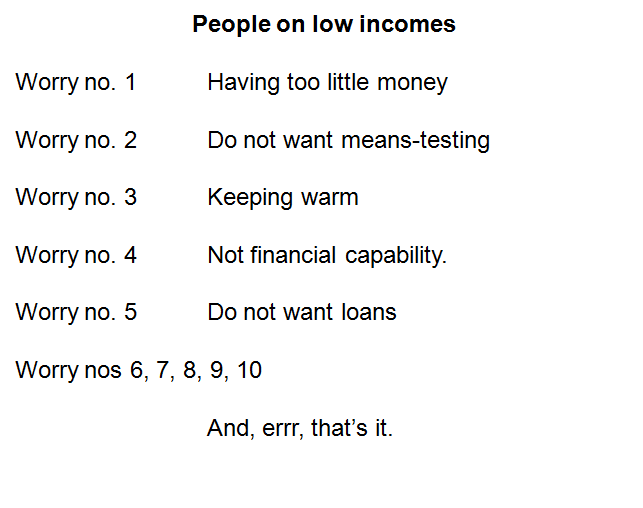
And I have a strange message for you today. Don’t change. Don’t adapt. Don’t for heaven’s sake modernise.
If you have £125 million to give to poor people, carry on giving it to them, it will make them less poor.
If you have your own ways of judging who needs money and who you will help and who you can’t do not think of systematising it. Of turning it into a pale copy of the means test used by the DWP.
If you want to tackle fuel poverty remember it has two ends – help people claim the money and state help they can get and give them money to insulate their homes as well as pay their bills.
If you have never spent money on financial education don’t start now. Your clients are much better being given the tenner they need than told why they should not have come to need it in the first place – advice which will probably cost more than a tenner to give.
And if you made grants never ever think of converting them to loans. People on low incomes need money not debt.
Thank you